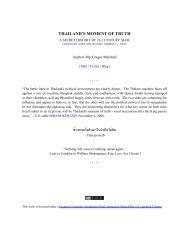THAILAND'S MOMENT OF TRUTH - ZENJOURNALIST
THAILAND'S MOMENT OF TRUTH - ZENJOURNALIST
THAILAND'S MOMENT OF TRUTH - ZENJOURNALIST
You also want an ePaper? Increase the reach of your titles
YUMPU automatically turns print PDFs into web optimized ePapers that Google loves.
and brother had all died, leaving her an orphan with one younger brother. Through some fortunate family<br />
connections she moved into the outer orbit of the royal court, and after an accident with a sewing needle<br />
she was sent to stay in the home of the palace surgeon who encouraged her to become a nurse. At the<br />
age of just 13 she enrolled at Siriraj Hospital's School for Midwifery and Nursing. She met Bhumibol's<br />
father, Mahidol Adulyadej - 69th of the 77 children of Rama V, King Chulalongkorn - in Boston in 1918<br />
after winning a scholarship to further her nursing studies in the United States. If anybody had expected<br />
Mahidol to get anywhere near the pinnacle of the royal line of succession, his marriage to a Thai-<br />
Chinese commoner would never have been approved. But he was far down the list. Bhumibol was born in<br />
Brookline, Massachusetts, in 1927, the couple's third child after a daughter, Galyani Vadhana, and a son,<br />
Ananda Mahidol. His name means "Strength of the Land, Incomparable Power".<br />
By the time Bhumibol was born, his father had been catapulted into contention for the throne, after<br />
several other claimants died young and childless. But Mahidol was studying medicine and wanted to be<br />
a doctor; he had no interest in becoming king. In December 1928, the family returned to Siam. Mahidol<br />
hoped to practise as a doctor in Bangkok, but palace law decreed that his royal status meant he could<br />
not touch any part of a patient's body apart from the head. Trying to escape restrictions he considered<br />
ridiculous, he went to work at the American Presbyterian Hospital in the northern town of Chiang Mai.<br />
Shortly afterwards the chronic kidney problems he had suffered all his adult life flared up again. He<br />
died in September 1929 in Bangkok, aged 37. This put the young Ananda first in line for the throne,<br />
with Bhumibol next. Even then, it seemed very unlikely that Bhumibol would ever rule Thailand. King<br />
Prajadhipok, Rama VII, was still a young man, and there were doubts about how long long the monarchy<br />
would last in a modernising Thailand and a changing world in which many royal dynasties were being<br />
swept from power. Sure enough, in 1932, a group of military officers and bureaucrats overthrew the<br />
absolute monarchy in Siam. In the political ferment, Sangwal took her sons to Europe, where they set up<br />
home in Switzerland.<br />
After trying and failing to claw back some of the royal powers stripped from him, Prajadhipok abdicated<br />
the throne in 1935, declining to name a successor. The government named Ananda Mahidol, nine years<br />
old and living in Lausanne, as King Rama XIII. Siam's new king and his brother remained in Switzerland,<br />
far from the rituals and intrigues of the royal court, apart from a two-month visit in 1938/39. After the end<br />
of World War II, during which Siam had been occupied by the Japanese, they visited again, arriving on<br />
December 5, 1945, in a country they barely knew.<br />
It was Bhumibol's 18th birthday; Ananda was 20, and according to many contemporary accounts, gauche,<br />
painfully shy and ambivalent about being king: Louis Mountbatten, the British commander in Southeast<br />
Asia, described him as "a frightened, short-sighted boy, his sloping shoulders and thin chest behung with<br />
gorgeous diamond-studded decorations, altogether a pathetic and lonely figure".<br />
There is no shortage of sources on Bhumibol's life, but finding accurate accounts is difficult. Most<br />
of what has been written is hagiographic and of limited reliability; a small proportion is vitriolic and<br />
even more unreliable. Two full-length book biographies by foreign authors have been published. Paul<br />
Handley's The King Never Smiles is a pioneering academic work, meticulously researched and infused<br />
with its author's deep understanding of Thailand after years working as a journalist in the country. It<br />
is banned in Thailand. William Stevenson's The Revolutionary King is riddled with factual errors and




